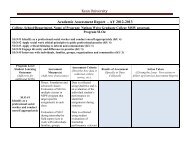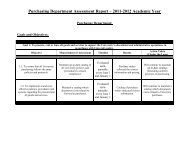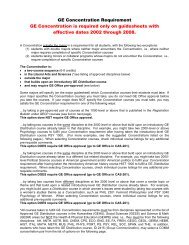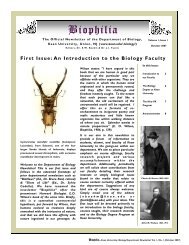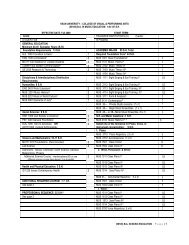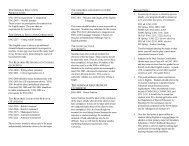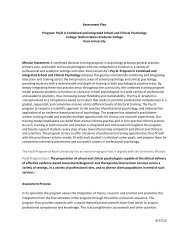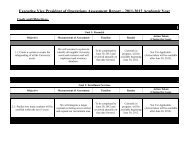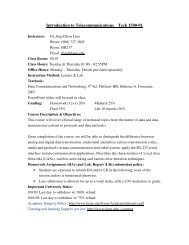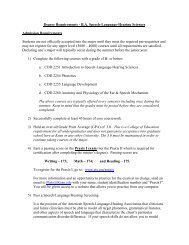Ethics in Criminal Justice - Kean University
Ethics in Criminal Justice - Kean University
Ethics in Criminal Justice - Kean University
Create successful ePaper yourself
Turn your PDF publications into a flip-book with our unique Google optimized e-Paper software.
<strong>Ethics</strong> <strong>in</strong> Crim<strong>in</strong>al <strong>Justice</strong><br />
CJ 3750<br />
Professor James J. Drylie<br />
Week 2
Ethical Resolutions<br />
• Identify the facts<br />
• Identify relevant values and concepts<br />
• Identify possible choices<br />
• Analyze the choices under an ethical<br />
system
Ethical Systems<br />
• Source of moral beliefs<br />
• The underly<strong>in</strong>g premises from which we<br />
make judgments<br />
• They are beyond argument.<br />
– Accord<strong>in</strong>g to Baelz (1977)<br />
• They are prescriptive. Certa<strong>in</strong> behavior is<br />
demanded or proscribed.<br />
• They are authoritative.<br />
• Logically impartial or universal.<br />
• They are not self-serv<strong>in</strong>g.<br />
self serv<strong>in</strong>g.
Basic types of Ethical Systems<br />
• Deontological<br />
– Concerned solely with the <strong>in</strong>herent nature of<br />
the act be<strong>in</strong>g judged. An act which is<br />
<strong>in</strong>herently good, even if it results <strong>in</strong> bad<br />
consequences is still a good act.<br />
• Telelogical<br />
– Judges the consequences of the act. A bad<br />
act that results <strong>in</strong> good consequences would<br />
be def<strong>in</strong>ed as good.<br />
• The “end end justifies the means.”<br />
means.
Immanuel Kant & ethical formalism<br />
• Kant (1724-1804) (1724 1804) believed that moral<br />
worth comes from do<strong>in</strong>g one’s one s duty.<br />
– Ethical formalism is a deontological system.<br />
– The determ<strong>in</strong>ant for judg<strong>in</strong>g whether an act is<br />
moral is not the consequence, but the motive<br />
or <strong>in</strong>tent of the actor.<br />
– A good good will will is the only th<strong>in</strong>g that is <strong>in</strong>tr<strong>in</strong>sically<br />
good.
Kant’s Kant s pr<strong>in</strong>ciples of EF<br />
• Act as if it were a universal law.<br />
– Would your actions be followed by everyone?<br />
• Treat humanity as an end, not a means.<br />
– Do not use people for your own purpose.<br />
• Act as if you were a lawmak<strong>in</strong>g member of<br />
the k<strong>in</strong>gdom of ends.<br />
– Your actions should contribute to and be<br />
consistent with universal law.
Jeremy Bentham & Utilitarianism<br />
• Jeremy Bentham (1748-1832)<br />
(1748 1832)<br />
• A teleological ethical system.<br />
• Good is determ<strong>in</strong>ed by the consequences<br />
of the action.<br />
• This doctr<strong>in</strong>e asserts that we should<br />
always act so as to produce the greatest<br />
possible ratio of good to evil for everyone<br />
concerned (Barry, 1985).
Religion<br />
• Probably the most frequent source of<br />
<strong>in</strong>dividual ethics.<br />
• Can be def<strong>in</strong>ed as a body of beliefs that<br />
address fundamental issues such as<br />
– “What What is life?” life?<br />
– “What What is good?” good?<br />
– What is evil?” evil?<br />
• Religious ethics, particularly Judeo- Judeo<br />
Christian, stems from a willful and rational<br />
God.
How do people know God?<br />
• Accord<strong>in</strong>g to Barry (1985)<br />
– Individual conscience<br />
– Religious authority<br />
– Holy scriptures
Natural law<br />
• Holds that there is a universal set of rights<br />
and wrongs that is similar to many<br />
religious beliefs, but without reference to<br />
a specific supernatural be<strong>in</strong>g.<br />
• Presupposes that what is good is natural<br />
and what is natural is what is good.
<strong>Ethics</strong> of virtue<br />
• <strong>Ethics</strong> of virtue asks<br />
– “What What is a good person?” person?<br />
• Ethical systems ask<br />
– “What What is a good action?” action?<br />
• The pr<strong>in</strong>ciple is that to be good, one must do<br />
good.<br />
• This system is teleological. It is concerned with<br />
act<strong>in</strong>g <strong>in</strong> such a way as to achieve a good end.
<strong>Ethics</strong> of Care<br />
• Another ethical system that does not<br />
depend on universal rules or formulas to<br />
determ<strong>in</strong>e morality.<br />
• The emphasis is on human relationships<br />
and needs.<br />
• Described as a fem<strong>in</strong><strong>in</strong>e morality due to<br />
the female role <strong>in</strong> childbirth.
Egoism<br />
• Postulates that what is good for one’s one s survival<br />
and personal happ<strong>in</strong>ess is moral.<br />
– Psychological egoism is a descriptive pr<strong>in</strong>ciple rather<br />
than an ethical prescription.<br />
– Refers to the idea that humans are naturally egoists<br />
and that it is unnatural to be any other way.<br />
– Enlightened egoism sees the objective as long-term long term<br />
welfare.<br />
– Egoism is the antithesis of utilitarianism.
Relativism & Absolutism<br />
• Ethical relativism describes those moral<br />
systems <strong>in</strong> which what is good or bad<br />
changes depend<strong>in</strong>g on the group or<br />
person.<br />
– Cultural relativism def<strong>in</strong>es good as that which<br />
contributes to the health and survival of<br />
society.<br />
– Situational ethics is often used as a synonym<br />
for relativism.
Absolutist Situational<br />
Rationality<br />
Law<br />
Rules<br />
Duty/Right<br />
Natural law<br />
Pollock, 2007: p. 61<br />
Emotion<br />
Mercy<br />
Discretion<br />
Need<br />
Religion



